Ellen and Jim Have a Blog, Too
We are two part-time academics. Ellen teaches in the English department and Jim in the IT program at George Mason University.


_Pallisers 7:14_: Abandonment and male obduracy, 2 transcripts (2) · 2 September 08
Dear Friends,
Our second 2 transcripts of 6 from Pallisers 7:14 comes from the second episode. The first scene dramatizes the quiet prudent abandonment by a male of a female; the second, two married people deeply at odds, unable to get together even though they have impulses to break through and reach one another. You must say they are having a difficulty in communication, but in reality the male is refusing to help the female. George (Terence Alexander) rejects Lizzie’s (Sarah Badel) attempt at physicality; the Pallisers (Philip Latham and Susan Hampshire) come near if not to blows, at least to swatting one another.
FIRST TRANSCRIPT
Madame Max breathing an intense sigh of relief as she shuts the door on Lord Fawn and puts her back to it dissolves into
Episode 27: George Leaves.
Scene 7: Hartfield Street, front room.
[This substitutes for Eustace Diamonds, Ch 75, pp. 719-724; it’s quite different since in Trollope’s chapter George comes to complain about the police chasing him (and she knew she had the necklace), is “subrisive,” “sneering,” presents a “hard face; he accuses her of hurting his “poor friend” Mrs Carbuncle; he asks if Emilius accompanying her to Scotland, and when she turns hostile, he remarks there was a time when even Frank wasn’t a “better fellow than himself.” He admits he prefers Jane to her because they have years and years together; one forgives old friends; it’s Lizzie who whimpers at the end; he does pat her head like a child.
In Raven’s Lord George is throughout rueful and fatherly, and he is there to make things “straight” beween them, to tell and hear candid truths; at the same time there are hints they have had sex when Lizzie says he was so expected and she so disappointed (and surprized) that he never sent a sign. She is the boy who cried wolf, for all he knows she still has the necklace.]
1. Establishing shot: we see Lizzie Eustace at the piano singing a song I can’t quite make out. It’s in the same harsh register or timbre as the Burns song she sang to Fawn when we saw her with Fawn at Portray castle. Her boudoir does resemble Madame Max’s: piano, curly plush curtain, white gauzy covers over the windows
2. Character performing: Lizzie sings “that has as happy been with you, and you remember me, and you’ll remember, you’ll remember me … (this seems her anticipating what her effect will have been on her various lovers, or it’s wishing this is so, a kind of revenge wish too).
3. Bridging shot: door seen to be opening, and George in the room hestitates next to the door
4. Dialogue.
Lizzie looks up: “George! (welcoming him) Yet how I’ve waited for you to come …”
George (looks reluctant at her) “Here I am.”
Lizzie: “But I have been lying upstairs at death’s door. Not a sign of you , not a single word …”
George: “Ah! Jane Carbuncle wouldn’t let me come. she was afraid that what you had might be catching” (we see how he is another emasculated male of this Lizzie matter; and also that his real adherence is to Jane Carbuncle who says she’s bored except for food)
Lizzie (coming over to him) “But you’ve come to …
Georgfe (another weak man) “Oh I assert myself from time to time.
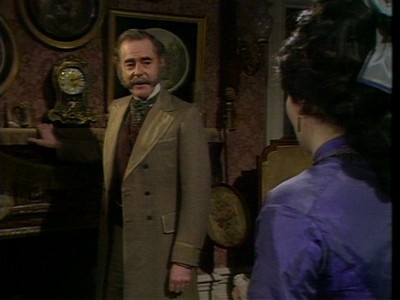
Beside I was getting uncontrollably curious, so Lizzie how are things with you now …
Lizzie: (suddenly all sentiment in her face and body and she looks appealing, only we have seen how easily she can shut this off; to be fair so can other people or characters): “Terrible (small voice) Oh George! (throws herself into his arms), George! George I need you so much! ...”
Geroge: “Calm, Lizzie, take it calm. Now then tell me as of this minute, how do you stand with the police?”
Lizzie. “Well they’ve not said anything. It has been ages since Crabstrick was arrested and still they’ve said nothing, nothing at all.
George: “I suspect they’re waiting until they’ve got it all absolutely straight, which is what I want to do Lizzie. Get it straight.” [Nothing like this in Trollope’s character]
Lizzie. Yes, well I will tell you everything if only you will help me.”
George: “All right, m’dear. Now (sits down next to her) May I take it that the necklace really was stolen at last by the thief who came to this house?”
Lizzie. “Of course it was.”
George. “You see for all I know you might have taken it to the theatre with you that night and still have it hidden someplace in which case I’d sooner be talking to a bomb, Lizzie.”
Lizzie: “It really was stolen as I told you.”
George. “Promise.”
Lizzie: “Cross my heart” (makes a sign)
George: “For what that is worth” (gentle laugh). “All right, Lizzie, I’ll help you what I can. Now just listen—whatever else happens Crabstick has almost certainly told the police that the necklace was stolen from this house and not from the hotel in Carlisle so very soon now they’ll be coming on you for perjuring yourself before the Recorder of Carlisle, and there’s only two things you might still do to stop them sending you to prison.
Lizzie: (Hands on head, quavering tone) “Oh George!”
George. “Either take a boat over the channel and hope they’ll not bother to stop you.
Lizzie (jumping up) “Oh I will … I would, if you only would come with me. Sweep me away over the sea, George, like Byron’s Corsair— you remember my Corsair
George: (we see in his eye he does not like this talk still) “No my dear (put her hands down) I shouldn’t sleep for fear you’d have the gold out of me teeth. Or you can do Lizzie as I advised you once before—make a clean breast of it to the police and hope they’ll let you down light.
Lizzie: “Oh no no no no I … I couldn’t do that … what would the Duke of Omnium say? and my friend the Lady Glencora Palliser?”
George: I tell you what they’ll say if you get sent to quad?
Lizzie: “Oh George”
George: “Lizzie!” (Really kind next to her) “I’ve told you what to do. Now are you or you are not going to do it” (holding her hands which as in the scenes with Frank she had put up to cling to him)
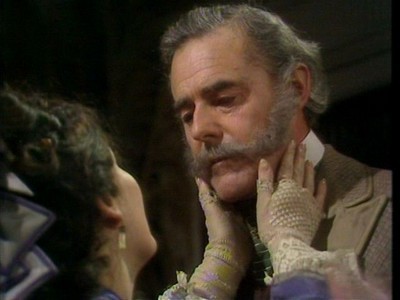
Lizzie (looks up with dark look in her eyes, hands on her head) “There must be an easier way. You see if only I had a man to champion to fight for me in the lists …. George, you do like me?”
George: “I think you’re entrancing” (in Trollope he says he finds her “very pretty”)
She smiles: “Then be my knight, George, marry me.”
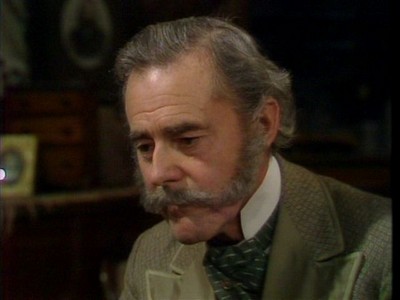
George has a sombre look in his eyes. This is one of those many stills where the actors transcends his material. I think the still is to the movie, as the line is to poetry.
Lizzie: “Say at least you’ll be with me.” (she has not read his face deeply but has seen something giving in, and so kneels and puts her hand on his chin—an age-old gesture of submission) “I do so need someone to be with.”
George (look of dislike at this—she’s going to dump herself, lies and all, on him as she tried to do with Frank). “Lizzie, whatever the end of this affair, you’ve already let us all such a dance as the devil himself cannot keep up with (Shakes his head, kindly gesture in him, gets up.). “No, my dear, Corsair or not, I’m not having you aboard my kayyak. You’re too hot a cargo. (He moves to the door while saying this and closes it quietly behind him.)
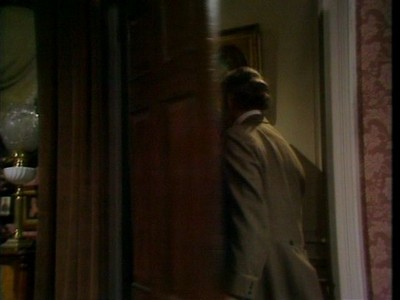
She is left sitting there, looking hard.
Lizzie’s continual referral to Corsair shows what a child she is when it comes to minds. She has no idea how men operate in their minds for real.
**************
SECOND TRANSCRIPT
From Episode 27: George Leaves
Scene 8: Matching Priory, the Duke’s bedroom.
[The Duke of St Bungay (Roger St. Livesey) has come to Matching with Plantagenet Palliser to discuss politics—away from very strong ears and prying eyes, but before they retire they come to the Duke’s (Roland Culver) bedside and Bungay presents grapes. Whether people in the 19th century brought grapes to the sick, I don’t know. During this time Lady Glen takes what is her usual place besides the Duke’s side, feeds him grapes, and mockingly undercuts the high-mindedness of the two men’s way of describing liberal politics: “Well, you see if they give away ever such a little, they’ll be allowed to keep everything else. That, as I understand it, is what the liberal party’s all about.” A few other sparks fly, as when Plantagenet says he has not been paying close attention to the Eustace case so can say nothing: Lady Glen: “If people only spoke about what they attended to closely, how very little there would be to say, eh Duke?”
This kind of remark points up the instinctive incompatibility of the two. Plantagenet says when St Bungay seems to say the same sort of thing as Lady Glen in more respectable language, that’s “rather a cynical way of puttin’ it, St Bungay.” But she seems gay, until a few seconds before the Duke and Palliser go off, and then with a rigid posture she calls her husband back. He stands by the door and turns round very reluctantly.]
1. Bridging shot: Lady Glen from the side, rigid, and Plantagenet turning round from the door. from the side she looks troubled and unhappy.
2. Dialogue:
Lady Glen: “Plantagenet? You’re not going to leave me here the moment that you’ve arrived?”
Palliser: “Oh, leave ya, but why not?”
Lady Glen: “Surely it is your turn to help entertain the duke. I’ve been doing it all these years. I am worn out with it.” [so years are understood as going back while we experenced the Lizzie matter] She is writhing her body in twisted ways away from him.
Palliser: “My dear, the Duke of St Bungay has come down here especially so that we may be quiet and work without …. interruption … on plans for the next … ”
Lady Glen: “You’re not the only one who works. I work too on your behalf and I get no help from you.”
Palliser. (Words or sounds in a bitter tone, not clear or coherent—a flawed DVD or his own reluctance to say anything specific) “Yes, of course my dear.”
[She presses the top of a chair with her arms intensely.]
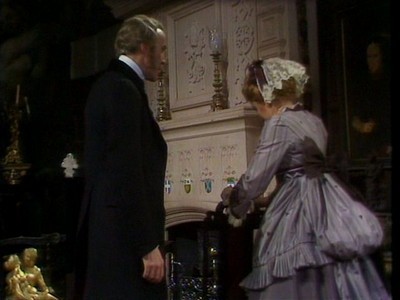
Lady Glen [turning back]: “Where would your [career?—swallowed word in anger] be if I didn’t get up my crushes to entertain …”
Palliser. “Oh, I think that you quite enjoy them … ”
Lady Glen: “Oh, I hate them.” (anticipates major theme of her ambivalence of Trollope’s The Prime Minister) “I’m sick of smiling in my face at
cracks of your tedious polticians. And there’s the children.”
Palliser. (suddenly belligerent. He puts out his arm aggressively as if to hold or do something to her, and she swats it away impatiently). “Uh huh” (a noise) “and what about the children?”
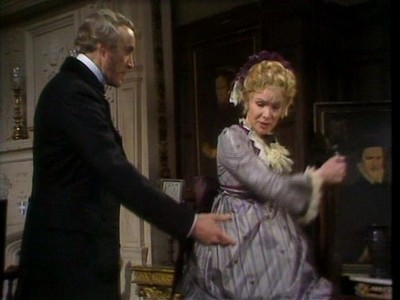
Lady Glen now grabs his arm and he pulls away. “Well, you don’t even pull your weight with them. You only see them out of duty” (sighs). “Oh, Planty, why can’t you enjoy them? play a game with them?”
He looks dark and hostile. They are now sitting and we get medium close shots of her face especially. Very stressed. Appealing to him. His face .. is closed.
Lady Glen: “Occasionally. But no no no no, it is nothing but a long face and work. What is the point of being alive if you don’t enjoy yourself sometimes?”
Palliser. (grim) “Well, Cora, I think my work is my enjoyment.”
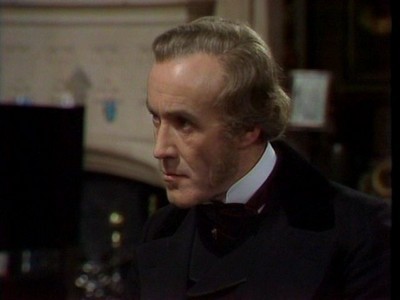
Lady Glen. (bitter voice) “Then I wish to God you looked as though you enjoyed it.” (He gets very impatient and hits the table.) “One of these days I’ll jump off the roof.”
[She gets up and walks off.]
Palliser now does pull her back near him. “Cora, I am tired and this scene (?I couldn’t catch this word or words) ...” (she tries to get away) “hey …. [then pause and then change of tone] come back to London for a change of air …”
She yanks her hand away, and is near crying. She then rubs her satin dress and nods “no.”
[She stalks out.
He sighs a hot sigh (it feels hot watching it).
Duke in bed is smiling a strange idiot smile; he had fallen asleep
and now wakes and either has not understood or as ever is supercilious.
Palliser grimaces back at him.]
Tomorrow: our two rogues, George and Jane, are set adrift congenially; and our secondary and admirable hero and heroine, Phineas and Marie, confront the past and future in a strained way.
Of all the intense dramatic scenes of this part, it is ironically, only, Lord George Jane Carbuncle (Helen Lindsay), who cometogether (ironically), in this case to gallantly support one another in yet another flight from their reality. So there is compensation for not wanting to conform and not seeking the world’s respect.
In Phineas (Donal McCann) and Marie’s (Barbara Murray) first encounter we see another variant on the difficulty of communication between two people, between two people who are by character instinctively alike and could understand and help one another, love one another deeply. Palliser and Lady Glen have the added insuperable problem of being intuitively or innately from character and from what they most desire unalike.
Ellen
See various links and a concise summary of 1:1-3:6, 4:7, 4:8, 5:9, 5:10, 6:11, 6:12, and 7:13.
--
Posted by: Ellen
* * *
Comment
- Nick Hay picked up on how in Pallisers 7:14 and Phineas Redux the women characters are beginning to be treated like adults.
I’d like to say there is a direct correlation between the age of a woman character and whether she is treated like an adult. Once the woman character is menopausal, she can be presented as powerful and good and wise; Lady Glen is now safely married, chaste and with 3 children, so it’s okay for her to have adult thoughts. No fear her sexuality will threaten any man or exemplify satisfied desire at her own will for any woman. Lady Fawn, Lady Lufton are good examples of this.
Again on his blog Nick has been writing some very insightful remarks on Trollope’s Eustace Diamonds and how it was adapted:
“have been, at last, viewing some more of the Pallisers DVDs (the adaptation of Trollope’s Palliser novels by Simon Raven et al.) and have reached The Eustace Diamonds. Raven presents Lizzie Eustace’s reading of poetry (Shelley) by a Scottish loch as an absurdity; I had questioned whether this was so in Trollope’s original and Ellen pointed out that I was (as often) misremembering; Trollope is mocking too. He has, for contrast to Lizzie, a character called Miss Macnulty, a woman forced into the dreadful role of ‘paid companion’ by her economic circumstances – she is a simple woman “For poor Macnulty, if she could only be left alone, this was well enough.To have her meals, and her daily walk, and her fill of novels, and to be left alone, was all that she asked of the gods. But it was not so with Lady Eustace”.
Lizzie Eustace, like Lucy Jordan, “asked much more than that”. Trollope is highly suspicious of this ‘more’. In Can You Forgive Her he writes..
"What should a woman do with her life? There had arisen round her a flock of learned ladies asking that question, to whom it seems that the proper answer has never yetoccurred. Fall in love, marry the man, have two children, and live happy ever afterwards. I maintain that answer has as much wisdom in it as any other that can be given-or perhaps more (I 109-110)."
Nick"
— Elinor Sep 2, 12:55pm # - P.S. Nowadays it’d be brought out that George has been having sex with both Lizzie and Jane.
E.M.
— Elinor Sep 2, 2:37pm #
commenting closed for this article
